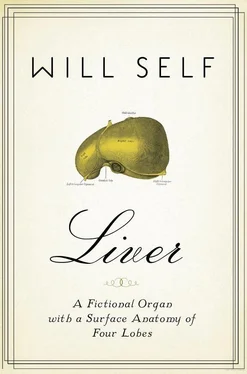In the weeks running up to this big day, Val had been finding the Extra’s increasingly thespian airs altogether intolerable. As Bolton pulled open the green baize door, his fellow members croaked ‘Break a leg’ (perhaps a superfluous remark, given that had any ordinary man drunk as much as the Extra had that afternoon, he might well have broken a leg descending the kerb of Wardour Street), but Val only sneered, ‘He oughta stick to choccie bars.’ A put-down occasioned by the fact that in the last year the Extra would have gone under, were it not for the residuals from a TV advert for Crunchie that settled his bar tab.
An hour later Val said to Hilary, ‘C’mon, Boy, let’s shut up shop.’ A remark that while commonplace to almost anyone, was to Hilary a warm gush of the sweetest, most nurturing intimacy.
No one knew who had first started calling Hilary ‘Boy’, or, if he were absent, referring to him as ‘the Boy’, but gradually the nickname had begun to stick. Initially, Val was having none of it. If the Dog barked, ‘Where’s the Boy?’, his bloodhound eyes too myopic to see that Hilary was emptying one of the heavy cut-glass ashtrays into the bin under the bar, then Val would snarl, ‘Boy? Boy? There’s no fucking boys in here, girlie, only you bunch of cunts.’ Yet, as time stalled, and Hilary became as much a fixture of the Plantation as the bust of Prince Albert on the piano, so even Val was driven to moderate his sneeringly impersonal shes and hers.
Hilary locked the till; Val pocketed the key. Hilary checked the toilet to see that no one had collapsed in it (a common occurrence with members’ guests, who, invited in for a singular ‘drink’, found themselves indoctrinated by a cult of libations); Val finished his V & T. The members slopped down the stairs into Blore Court, sniffing the astringent bouquet of the early-evening piss left there by the dossers. Hilary switched off the lights and locked the door of the Plantation; Val pocketed the key.
Crossing Wardour Street, then rounding the corner by the Vintage House and proceeding up Old Compton Street, the Plantation members — who appeared in public, en bloc, perhaps only once or twice a decade — presented a curious spectacle: overgrown children, their clothes a lustrum or two out of date, holding hands to form a crocodile that swam upstream against the current of fluvial time.
Out in front was the Dog, sniffing the route ahead, then darting back — if an overweight Scots drunk can ever be said to ‘dart’ anywhere, unless, that is, he’s actually playing darts — to round up the others.
Val and Hilary had linked arms — but out of desperation, not defiance. Val had a spotted silk scarf knotted around his scraggy throat; dark glasses pinched his ruby nose with its bloody filigree. In his free hand a walking stick wavered over the paving; he looked like a sick old man — he was forty-six. Alcohol had done ageing’s business — psychically as well as physically. Val was so long accustomed to the furred tranquillity of the Plantation that rush-hour London had a furious, insect intensity for him; as he proceeded among them, the pedestrians buzzed and flitted, settling in the food-spattered roadway, then taking flight when a lumbering lorry tried to crush them.
Up to Cambridge Circus, then dazedly across and on to the Seven Dials. Hilary staggered over the cobbles of Neal Street; he needed Val’s support almost as much as vice versa. The slim hips that Val had once impotently coveted were now pulpy. Beneath his Breton fisherman’s jersey Hilary’s liver was swelling, as fatty globules accumulated in its cells. Already the macrovesicular steatosis was under way, and, to confirm further still that Hilary warranted the feminine personal pronoun, a spongy mass was building up in concentric rings around his nipples; a foretaste — for the paps that ne’er gave suck — of alcohol-induced gynaecomastia. Val’s clawed hand, its nails striped with the paired bands of hypoalbuminemia, dug into the soft underside of Hilary’s wing. He guided his fattened goose past the ugly pile of the Freemasons’ Hall on Great Queen Street — possibly the pre-eminent club among the many who would never have accepted these members as members.
Her Ladyship was flagging on the long march, while the Typist collapsed hopelessly on the lip of a concrete cup spiky with greenery. A passer-by, confused by her two pieces of tweed and general air of respectability, leant down to inquire if she was ‘all right’, then recoiled from her gin breath and hurried on.
The stony canyon of Kingsway terrified the members; they hugged the ankles of the buildings, keening for mercy. They almost scampered into Lincolns Inn Fields, and made their escape, via the Old Curiosity shop, into Portugal Street.
They didn’t properly regain their breath until, cigarettes lit, they were ensconsed in the theatre bar, and the Martian had bought them all a drink — a triple for Val, who was most in need. ‘Why — why the fuck,’ Val panted, ‘did we fucking walk here?’
But, of course, none of them knew.
The crowd in the bar were not the usual sort of first-nighters. These sports-jacketed men, with British Home Stores bolsters of wives, had driven in from the outer suburbs, or even further afield; some with teenage children, others with elvers still more jellied. No more familiar with Beckett than Val Carmichael (less so, in point of fact, because he had met the playwright, once, with Trouget. ‘What’s he like?’ the Extra had asked. ‘Her?’ Val replied. ‘Total cunt.’), these punters had come to see Terry Pierce, the fresh-faced and rubber-legged star of the hugely popular peak-time sitcom Baloo’s Den , in which he played an accident-prone young Scout master.
Backstage, Pierce had been appalled by the state that Bolton had arrived in. The Extra caromed off the distempered walls and nutted the safety lights’ wire basketry. However, after applying to an attentive stagehand for medicinal cocaine, the actor, who was to be the very embodiment of Beckett’s joyful pessimism, did indeed achieve a kind of. joyful pessimism.
‘Terry, darling,’ he slurred, propped in the doorway of his costar’s dressing room. ‘Don’ worry ’bout nuffin, sweetie. All I gotta fuckin’ do is sit there, babes — iss you gotta do the work!’
This, while technically accurate, was still not particularly reassuring for Pierce, who, in common with so many farceurs , had a deep — almost pathological — yearning to be taken seriously. The Extra, as Hamm, might well be able to sit in ‘an armchair on castors’ for ninety-some minutes, but whether he could bring the right kind of sonorous asperity to lines widely regarded as the very acme of bleak Absurdism seemed altogether doubtful. He couldn’t even remember the names of the actors playing Nell and Nagg — who fluttered about solicitously in their grey weeds, faces doubly whitened — merely waving them away with an idle, ‘Will you fuck off, you little cunts.’
Bare interior. Grey light. Left and right back, high up, two small windows, curtains drawn. The spartan set and insufficient lighting mandated by Beckett’s anal-retentive stage directions may have temporarily dampened the audience’s spirits — they were, after all, anticipating an evening rich with belly laughs — but the entrance of their hero, and his funambulist compliance to those self-same directions, soon ignited outbreaks of giggling, especially among the teenagers.
. goes and stands under window left. Stiff, staggering walk. He turns and looks at window right. He goes and stands under window right. He looks up at window right. He turns and looks at window left. He goes out, comes back immediately with a small step-ladder.
Читать дальше












